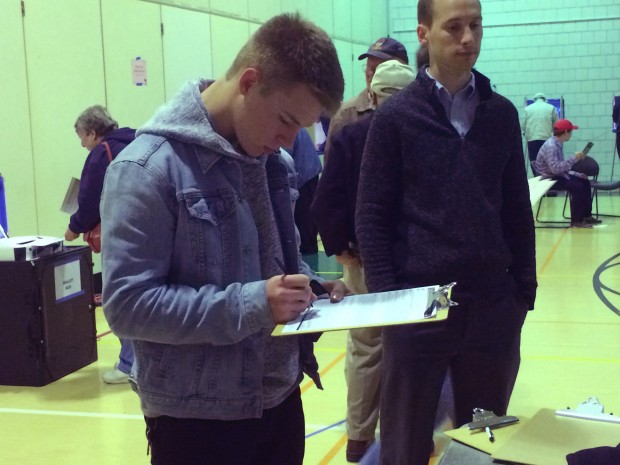
Soon after Roy Brook voted Tuesday at a community center in Bessemer, Alabama, he grabbed an American flag and set out to convince others to do the same.
“I’m not telling anyone what to do,” said Brook, 67, who resumed the place alongside local roads he has occupied for much of the last year, with a sign urging passersby to vote. “The idea is to reach as many people as I can with the message of America… If you’re here, love it, be a part of it.”
On Tuesday, millions of Americans marked the end of a bitterly divisive presidential campaign by joining him to do just that. They expressed both strong support and deep dislike for Brook’s candidate, Republican Donald Trump, as well as for Democrat Hillary Clinton. But if they agreed on one thing it was that, after a presidential campaign laced with vitriol, they would at least have the final word.
“I’m excited to be here and have it matter so much,” said Gabby Formica, 24, a graduate student who cast a ballot for Clinton Tuesday in South Philadelphia, noting that Pennsylvania was a swing state.
Voters’ determination to be counted was evident from the moment the first polls opened in the darkness of midnight in northern New Hampshire, and dawn elsewhere. Throughout the day, long lines and passionate opinions confirmed the stakes.
They waited outside churches and synagogues, community centers and schools, often with snacks and children in tow.
In Los Angeles, they voted alongside the lap lanes of the Echo Park Pool and in Chicago, they cast ballots in a bowling alley over the racket of downed pins.
They voted at a county fairgrounds in Moscow, Idaho, a strip mall recently swamped by 10-foot floodwaters in Denham Springs, Louisiana, a Buddhist temple in Long Beach, California, and on the run in Colorado, Oregon and elsewhere where special drop boxes accepted ballots from joggers and motorists.
Some celebrated their votes, confident of the outcome.
“We’re the United States of America. We can overcome anything,” said Melanie Draheim of Houston, after casting her vote for Trump.
Others described the election as an albatross weighing on them.
“I’ve been really stressed out about this election,” said Belinda Hedrick, 62, of Mission, Kansas, who came straight from a spin class, and was still sweating, when she cast a vote for Clinton. “It’s the first time I’ve ever woke up at night worrying about stuff.”
In Indianapolis, biologist Scott Salmon, 32, said he, too, woke up anxious, before biking to the polls.
“We have a bottle of champagne if Hillary wins and a bottle of rum if Trump wins — that kind of anxious,” he said.
Many voting Tuesday hewed to their established politics. But some said the accusations of the campaign had pushed them across party lines.
Lisa Moore, a Republican from Glen Rock, New Jersey, said she voted for Clinton. “I think the Republican party has gone way right of the majority of at least the residents of this section of the country,” said Moore, an exercise instructor.
“As a woman, in good conscience, and as the mother of a daughter, I can’t vote for somebody who’s so morally reprehensible” as Trump,” she said.
Meanwhile, Democrat Jim Eul, 61, a retired plumbing inspector for the city of Chicago, said his intense dislike for Clinton had persuaded him to vote for Trump. He said he couldn’t bear sitting out the election, but expressed disappointment in the choices. “You’ve got two big political organizations and these are the only two they can come up with?”
Regardless of party, voters agreed the stakes of the election were tremendous.
In Anchorage, Alaska, Jeanette O’Brien, 72, said she voted for Trump because he is capable of rebuilding schools and cities that she blames President Barack Obama for letting decay. But whoever wins, she expects unrest, even a possible civil war.
“Millions of Americans will stand up to take the country back if they have to,” she said.
A fellow Alaskan, Warren Urda, explained his vote for Clinton was also about long-term consequences. “I believe that person will select the next four Supreme Court justices and that will affect us for the next 50 years, not just for the next four years,” said Urda, a retired dentist.
Many voters expressed worries that merely counting the votes will not heal the country’s divide.
On Tuesday, Elizabeth Gil, a law student in Miami Lakes, Florida, would not say who she voted for, but expressed hope for what comes next.
“I think people want to move forward,” said Gil, who avoided early voting because she treasures the experience of going to the polls on Election Day. “There’s too much division. If we’re going to work with one another, to hear each other’s different points of views, that is how we can move forward together as a country.”

